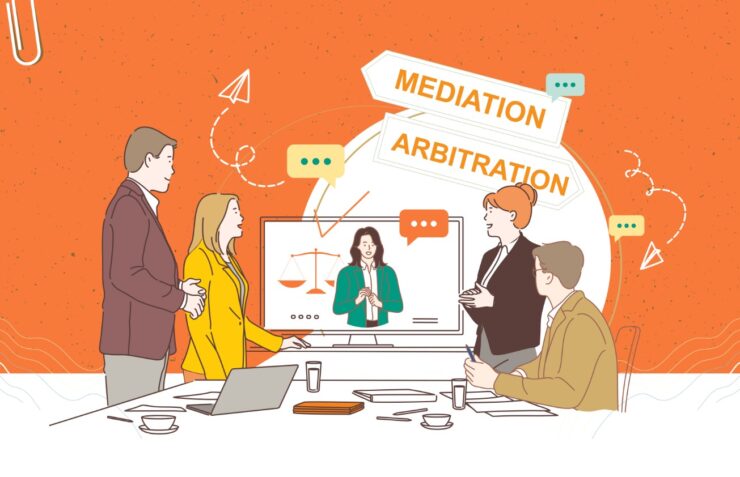In an era defined by rapid technological progress, the world of conflict resolution has not remained untouched. Traditional mediation, once confined to physical spaces, has embraced the digital realm.
This paradigm shift from face-to-face interactions to online mediation brings forth a host of advantages that cater to the modern world’s needs.
By harnessing the power of digital platforms, mediation has become more accessible, cost-efficient, flexible, private, and neutral. Let’s delve into the transformative potential of online mediation and its numerous benefits.
Online mediation is defined: Virtual conflict resolution through digital platforms
Online mediation services refer to the process of resolving disputes through digital mediums. Mediators and participants engage remotely, leveraging virtual communication tools and platforms to navigate conflicts. This shift in approach has widened the scope, allowing parties to engage despite geographical distances.
It’s a logical step in a world where technology connects us beyond borders, making it possible to bridge gaps in conflict resolution.
This evolution towards online services not only enhances accessibility but also harnesses the power of connectivity to bring effective resolution within reach for individuals and businesses worldwide.
Accessibility: Overcoming geographical barriers for participants and mediators

Accessibility takes a leap forward in the digital age with online mediation, dismantling geographical barriers that once hindered conflict resolution. Participants from different corners of the world can engage in the process without the constraints of distance.
This inclusivity extends to mediators as well, who can now offer their expertise to a global clientele without the need for travel.
This democratization ensures that diverse perspectives enrich discussions, enhancing the potential for effective resolution.
Cost-efficiency: Reduced expenses for both parties compared to in-person mediation
The cost-efficiency is a compelling advantage that resonates with individuals and businesses alike. Unlike traditional in-person mediation, where travel expenses, accommodation costs, and logistical overheads can accumulate, virtual conflict resolution slashes these financial burdens.
Participants save on transportation, eliminating the need for long journeys to these centers.
Moreover, mediators can offer their services without the constraints of physical location, leading to reduced fees. This democratization makes it accessible to a broader range of people who may have been deterred by the financial implications.
As a result, this process not only promotes cost-effective resolution but also aligns with the modern world’s emphasis on efficiency and resource conservation.
Flexibility: Convenient scheduling and session options for diverse time zones
One of the standout features of online mediation is its flexibility. With participants often spread across various time zones, scheduling conflicts can be a roadblock in traditional mediation.
Online platforms offer the convenience of setting up sessions at times suitable for everyone, ensuring that conflicts can be resolved without adding further stress to already strained relationships.
Privacy: Exploring secure platforms for confidential mediation proceedings

Privacy is paramount in conflict resolution. Online mediation platforms invest heavily in ensuring secure and encrypted channels for communication.
This digital layer of confidentiality often surpasses what is possible in physical settings, fostering an environment where participants feel safe to share their concerns openly.
Neutrality: Ensuring an unbiased environment in online mediation despite the digital setup
Maintaining neutrality is a cornerstone of effective mediation. Despite the digital landscape, online mediation platforms are designed to facilitate impartiality.
Mediators guide discussions, monitor interactions and create a balanced atmosphere for parties to express themselves without bias, just as they would in a traditional setting.
Technology’s role: Tools aiding communication, document sharing, and virtual meetings
In the realm of online mediation, technology plays a pivotal role by offering a suite of tools that streamline the process. Communication is enhanced through video conferencing and chat platforms, enabling parties to engage in meaningful dialogue despite physical distances.
Document-sharing capabilities facilitate the exchange of evidence and information, fostering transparency. Virtual meeting software ensures that participants can convene seamlessly, transcending time zones.
These technological aids not only replicate in-person interactions but also enhance them, making collaborative conflict resolution more efficient and effective.
As technology continues to evolve, these tools are likely to become even more sophisticated, further elevating the potential in resolving disputes across the globe.
Case studies: Successful instances of online mediation across various disputes

Numerous real-world examples highlight the efficacy of online mediation. From family disputes to commercial conflicts, online platforms have proven their worth.
In a family context, estranged members have reconnected and reconciled through mediated online conversations.
Similarly, businesses have found efficient solutions to complex contract disagreements, saving time and resources in the process.
Challenges: Addressing concerns like communication gaps and technical issues
Although innovative, digital mediation is not without difficulties. Effective conversation might be hampered by language hurdles or inadequate internet connections. The operation of sessions may be interfered with by technical problems like audio or visual problems.
But these difficulties can be reduced with preemptive steps. Communication gaps can be resolved with the provision of multilingual help and clear rules on internet requirements. Technical hiccups may be reduced with dependable tech assistance and user-friendly platforms.
A smoother route to effective dispute resolution in the digital era is created by adopting these solutions, which ensure that the benefits are not obscured by challenges.
Future prospects: Potential growth, integration of AI, and global acceptance
The future of online mediation is promising. As technology continues to advance, so will the capabilities of virtual conflict resolution platforms.
The integration of artificial intelligence may assist mediators in analyzing data and proposing innovative solutions. With more successful cases, global acceptance will likely increase, shaping a new era of efficient and accessible conflict resolution.
Conclusion

In conclusion, the digital age has ushered in transformative changes to the field of mediation. Online mediation’s benefits are evident in its accessibility, cost-efficiency, flexibility, privacy, and neutrality. Technology’s role in aiding communication and document sharing cannot be overstated.
Successful case studies underscore its effectiveness, even as challenges are acknowledged and addressed.
The future holds immense potential, with the integration of AI and growing acceptance on a global scale. Embracing online mediation means embracing a new dimension of conflict resolution that is adaptable to the needs of our ever-evolving world.

